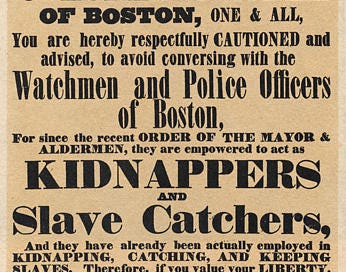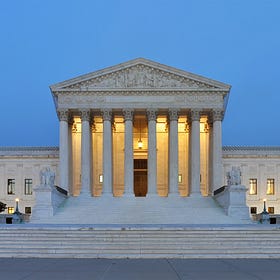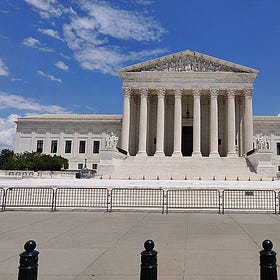Trump's deportations have echoes of slavery
The constitution does not allow this, but it used to
Thanks for reading America Explained. If you haven’t already, please consider upgrading to a paid subscription. This will enable you to read all of this post and access the full archive. It will also enable me to put more time and energy into this newsletter, something that I’m hoping to do in order to cover the new administration more thoroughly. If you’re already a paid subscriber, thanks for supporting independent media and making it possible to do what I do.
Tomorrow is the 160th anniversary of Abraham Lincoln’s assassination, and recently I’ve been thinking a lot about “the Great Emancipator” and his role in creating the American constitution of today - the constitution that is under grave threat from Trump and his cronies.
In the popular imagination, the U.S. constitution is often thought to have come into existence in one act of “genius” by “the Founding Fathers” at the Constitutional Convention of 1787. But in reality, the constitution has always been a changing and evolving document, one that has many origin points. At times it has undergone transformations so profound that it can barely be considered the same document.
If we want to understand the American constitution as it exists today, we have to pay attention to these other moments rather than just the tired old question of “what the Founders intended”. And of those moments, none is so important as the one set in motion by Lincoln - post-Civil War Reconstruction, often referred to as the “Second Founding”.
The pre-Civil War constitution lacked the concept of equality before the law. The law at this time recognized all kinds of hierarchies of inequality. The most obvious was the hierarchy between master and slave, but others existed as well. Under the legal doctrine of “coverture”, women were usually not able to own property or enter into contracts, but instead had to subsume their legal identity in that of their husbands. And contracts between masters and servants often required the latter to sign away their rights to the former.
As a result, the idea that any two people could walk into a courtroom and be afforded equal treatment would have been laughable and bizarre to Americans before the Civil War. Perhaps the signal change brought about by the Second Founding was to attempt to sweep at least some of these hierarchies away, by enshrining in American law the idea of equality.
With the failure of Reconstruction and the rise of Jim Crow, that effort stalled out in the short term. But it did create a new type of constitutionalism - one in which equality before the law was at least a recognized principle. Following the “Second Reconstruction” of the 1960s - the outcome of the civil rights movement - that constitution finally became America’s constitution, more or less.
And if I am not mistaken, it is precisely this constitution which the Trump administration is currently trying, in deliberate fashion, to destroy.
Its vehicle has been a series of deportations to El Salvador of Venezuelan and Salvadoran nationals who the administration claims - without having presented evidence - are members of a violent transnational criminal gang. The men are now being held in a highly secure prison notorious for human rights abuses, and with no apparent way to communicate with the outside world.
The deportations have attracted attention because they are based on the Alien and Sedition Acts, which the administration claims allow expulsion without due process. These laws, dating from the 1790s, are considered by most constitutional scholars to be horrific mistakes, as outside the canon of mainstream constitutional thought as Dred Scott, Korematsu, and Plessy. Unfortunately, although Thomas Jefferson’s election in 1800 signaled a decisive rejection of the acts, Congress never actually got around to repealing them.
Among the other abuses that the administration has committed by invoking these laws, one stands out. It admits that it wrongly deported Kilmar Ábrego García, a Salvadoran living in Maryland, due to an administrative error. Despite admitting that it made a mistake and being ordered by a judge to make efforts to bring him back, it is refusing to do so.
The administration claims that as soon as Ábrego García entered the custody of another country, his detention became a matter of foreign affairs, something the courts have no jurisdiction over. The Supreme Court will rule on the matter shortly.
If the Trump administration’s actions are upheld - or if it ignores the Supreme Court - it is hard to overstate the size of the hole that would be blown in the modern-day constitution. The administration is claiming the right to seize a person, deport them to a torture prison in another country, and then be completely immune to any court order requiring them to bring that person back. It happens that Ábrego García is not an American national. But there is nothing stopping the administration pulling the same trick with an American, disappearing someone forever. The threat to freedom could scarcely be greater.
And what this reminds me of more than anything else is slavery.
Before the Civil War, the United States was split into free states and slave states. For blacks, the slave states were abominations - places in which they could be forced into bondage, mutilated and tortured, raped and burned. For free blacks living in free states, or escaped slaves who managed to make their way there, there was no greater horror than the idea of being sold “down the river” into slavery.
And yet, it happened. One of the great causes of the tension which led to the Civil War was the Fugitive Slave Act of 1850, a federal law which required officials in free states to cooperate with the return of escaped slaves to their owners. It provided for no due process, meaning that a slaveowner had only to make an accusation to a federal marshal to have it enforced. As a result, not a few free blacks living in the North also found themselves spirited away into slavery in the South.
For the African Americans who made this journey, it was a nightmare - a trip from a place where they had rights to one where they had none. Simply on the basis of an accusation or a mistake, they could be sent to a legal jurisdiction in which nobody would ever give them a sympathetic hearing, and where they would have to remain performing back-breaking labor under threat of torture until they died.
Thanks to the war that Abraham Lincoln led and the constitution that he helped to create, that world is gone. After the Civil War, the Thirteen and Fourteenth amendments transformed the constitution, creating the promise of a world in which slavery could not legally exist and all “persons” (not even just “citizens”) had equal rights before the law.
No wonder, then, that Trump had to look abroad - beyond the reach of the constitution - to build his own abomination. The prison to which he sent Kilmar Ábrego García also requires inmates to perform forced labor, and it also subjects them to torture. It provides them with no due process or ability to safeguard their rights. It is beyond the pale of the law, just like the plantations of the South.
If Trump ultimately wins the legal right to impose this condition on anybody, then it will be one of the greatest blows that freedom in America has suffered in over a century. It will also, quite literally, undo one of the great victories of the Civil War.
Thanks for reading America Explained. If you haven’t already, please consider upgrading to a paid subscription. This will enable you to read all of this post and access the full archive. It will also enable me to put more time and energy into this newsletter, something that I’m hoping to do in order to cover the new administration more thoroughly. If you’re already a paid subscriber, thanks for supporting independent media and making it possible to do what I do.
When Supreme Court justices fly their true colors
The de-mythologizing of the Supreme Court is underway. But it's never been the rarefied and detached palace of justice that it is sometimes made out to be.
How to reform the Supreme Court
"Packing" is not such a good idea. But there are sustainable and productive ways to reform the Supreme Court, if only someone would take them up.
No, don't bring back the Monroe Doctrine
Trump wants to bring back the Monroe Doctrine. That's not a good idea.







Some how we must stop the want-be dictator - Trump - before it leads to a "arms" on our soil.